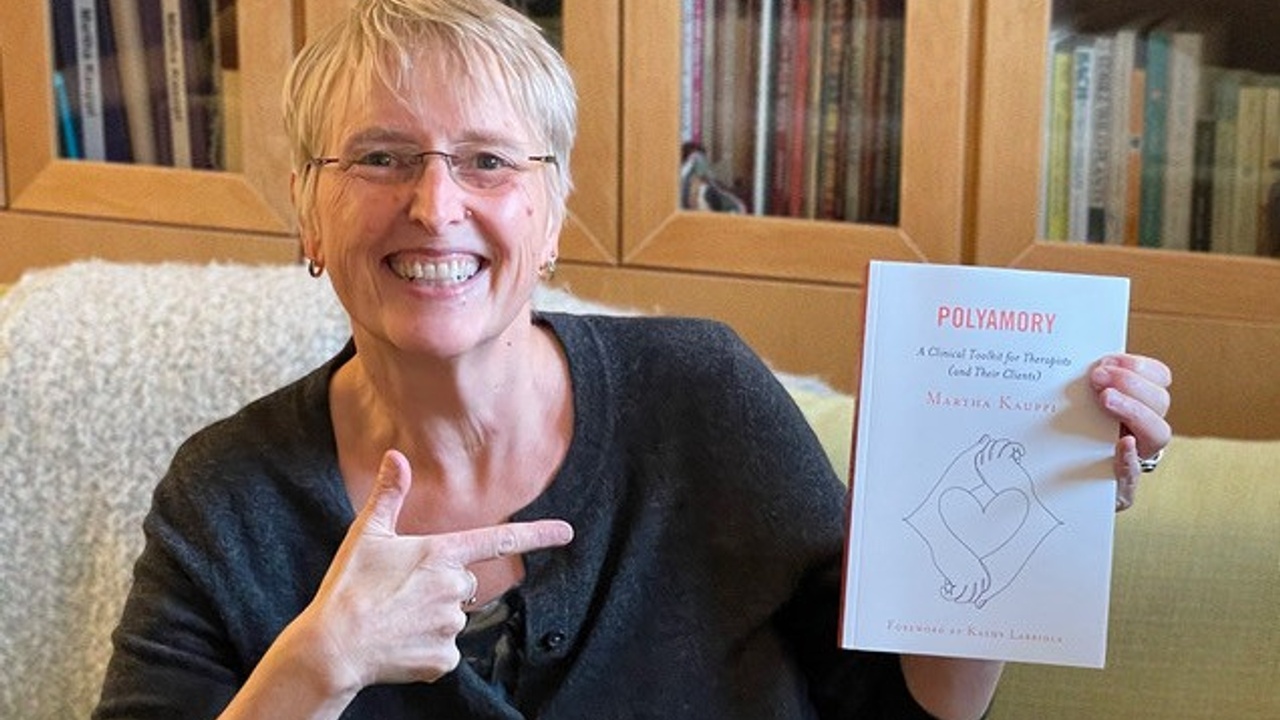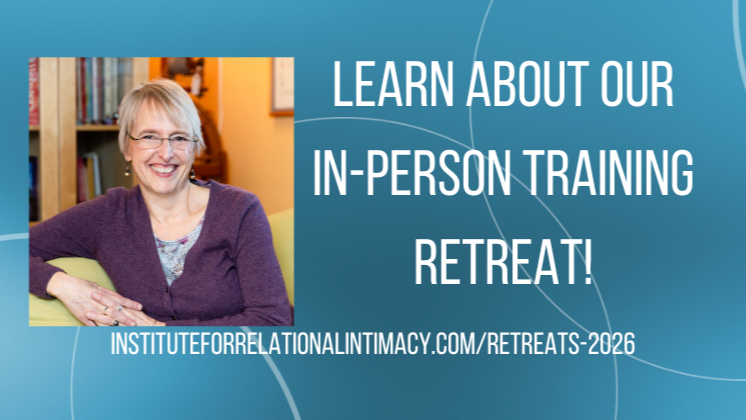Is Secure Attachment In Polyamory Possible?
May 13, 2021
Hello! Martha Kauppi here, AASECT-certified sex therapist and supervisor. It’s book launch month for me. My new book, Polyamory: A Clinical Toolkit for Therapists (and Their Clients) is out and you can order it from Amazon, international booksellers, independent bookseller A Room of One’s Own. Links are below. Or, you can order it from the publisher directly, Rowman and Littlefield.
Today, I want to talk about a secure bond in polyamorous relationships. I’ve heard some leaders in the field of couples therapy over the past several years come right out and say, “It is not possible to have a secure bond in an open relationship,” and I very strongly disagree. The reason I disagree is not theoretical. The reason I disagree is entirely practical and experiential. I have personally seen, known, understood, and worked with lots of open relationships. Friends, family members, clients, lots of people are in open relationships that are working great.
The interesting thing about people who are in relationships that are working great is that a relationship therapist might not actually see them in their office. As a therapist, the people who come to me in my office or who come to me in therapy, teletherapy, coaching, or whatever are struggling in their relationship or are struggling personally in some manner and that’s why they want some support and some help. It’s an interesting thing when a therapist says, “Oh yeah. That doesn’t really exist.” I think we could all just back out a little bit, calm down, and look at: “Well, maybe it doesn’t exist in your office and also, why might that be?”
I know that there are polyamorous relationships that work and I know that there are polyamorous relationships where people struggle, there are monogamous relationships that work and there are monogamous relationships that struggle. I’ve seen all of this in my office. I think lots of us have. Why might one particular therapist see that stuff? Well, possible because somebody came right out and said, “Polyamory doesn’t work.” If somebody came right out and said, “Polyamory doesn’t work,” I’ll tell you what, if I were in an open relationship, that’s not the therapist I would choose. Let’s talk a little bit about when polyamory works, what is that? One thing it is is a secure bond. It is absolutely possible to be in an open relationship and feel safe, secure, grounded, connected, important, seen, lifted up, prioritized—yes! It’s an interesting concept that we can’t prioritize, or give a feeling of primacy, to more than one person at once. What?! Of course we can. We do it with our kids all the time. Do we decide, “I’m only going to have one child because if I have two children, I will have to choose between them”? We don’t do that. We don’t say that. We just assume that we’ll have more love to give. Somehow, we’ll find the love. Somehow, we’ll find the time. Somehow, we will find it because it’s the family that we wanted. That’s one thing that I really want to say about polyamory. It is possible to have a secure bond in an open relationship.
Another thing I want to say about it is that differentiation is important. Again, also true for monogamous relationships, also true for people who aren’t even in a relationship, differentiation is important. I’ve done some previous blogs on differentiation so I’m going to touch on that lightly here and then refer you to previous vlogs and blog posts about differentiation.
Differentiation has three and a half parts. The first is being able to look inside yourself and figure out what you think, feel, and prefer separate from what anybody else might want for you or from you. The second is being able to get grounded, there’s the half, sufficiently enough to say your truth to somebody else even if you think they’re not going to agree with you. Third is to get grounded enough to hear from someone else something that is very hard for you to hear.
For instance, “My love, I think I might want to open my relationship with you. What do you think about polyamory?” or, “You know, I’ve been wanting to tell you that I developed a crush on somebody at work. I have a crush on a coworker and honestly, I might want to act on it at some point. Can we talk about this as an option?” This is an example of why differentiation is important as I am applying it to polyamory.
It’s equally important in a monogamous relationship because if you’re listening to this and you’re in a monogamous relationship or ever have been before, have you ever had a tough topic come up that you needed to discuss well? Yeah. That’s just a relationship issue. It’s not a polyamory issue. The only aspect of it that is about polyamory is when the topic that you want to discuss is opening your relationship or the topic that your partner wants to discuss.
Why do we shy away from that more than we shy away from other tough conversations? What if we just imagined that actually, we’ll get through it? We’ll figure it out. We’ll have a conversation. We’ll understand each other’s viewpoints. Maybe together we’ll go out and do a little research project. We’ll learn a whole bunch of stuff about what it takes to do polyamory well. We’ll start building the skills. We’ll run a few experiments.. We’ll see how it works. What if that? The thing is that if you were going to do that, you might need some support.
To be honest with you, that is exactly why I wrote this book, so that you could actually get the support because a slender volume or something that really talks on the surface about the details of what polyamory is is only the tip of the iceberg. You really need to know what goes into it and how the heck do you even build that? How do you build a secure bond? How do you build differentiation of self? How do you get that half, the holding steady part, that underlies differentiation that speaks to both attachment and neuroscience? This book has a lot of that because it’s not possible to deal with clinical challenges related to polyamory as a therapist without understanding all of that.
I think it’s really helpful, if you’re going to be in a relationship, to have an understanding of what attachment has to do with relationships, what differentiation has to do with relationships, what neuroscience has to do with it. How does all of this weave together? How do all of these strands come together and help you make what you want to have happen in your relationship and life, whatever that might look like? I don’t care what it looks like: polyamory, monogamy, swinging, monogamish, openish. I don’t care. Whatever you want. It’s helpful if somebody can say, “Here’s a step, here’s a way to look at it, here’s a way to figure out where you’re getting stuck.”
Then, “Here’s a worksheet to help you get through this, here’s a worksheet to do on your own, here’s a worksheet to do together with a partner or partners. Here’s how you would have tough conversations between two people. Here’s how you would have tough conversations between more than two people.” All of that, you guys, is right here.
I learned a lot about the complexities of relationships by looking very closely at the code that people in workable poylamorous relationships seem to have cracked. A lot of people have done that, also—cracking some relationship code—by looking at monogamous relationships. But if they are looking at monogamous relationships that include things like infidelity, we’re still not at the level of transparency that people in polyamorous relationships are aspiring to and in large part, achieving.
All right. That’s what I have to say about the importance of a secure bond, differentiation of self, and neuroscience to creating a healthy relationship, whatever kind of relationship that is. I hope you enjoy my book. Give me some feedback. Go to Amazon and leave some feedback. Thank you so much for following my work, watching my vlog, and reading my book.
Available On: Amazon, Independent Seller, Rowman.com, International: Blackwells, Waterstones, UK Bookshop






